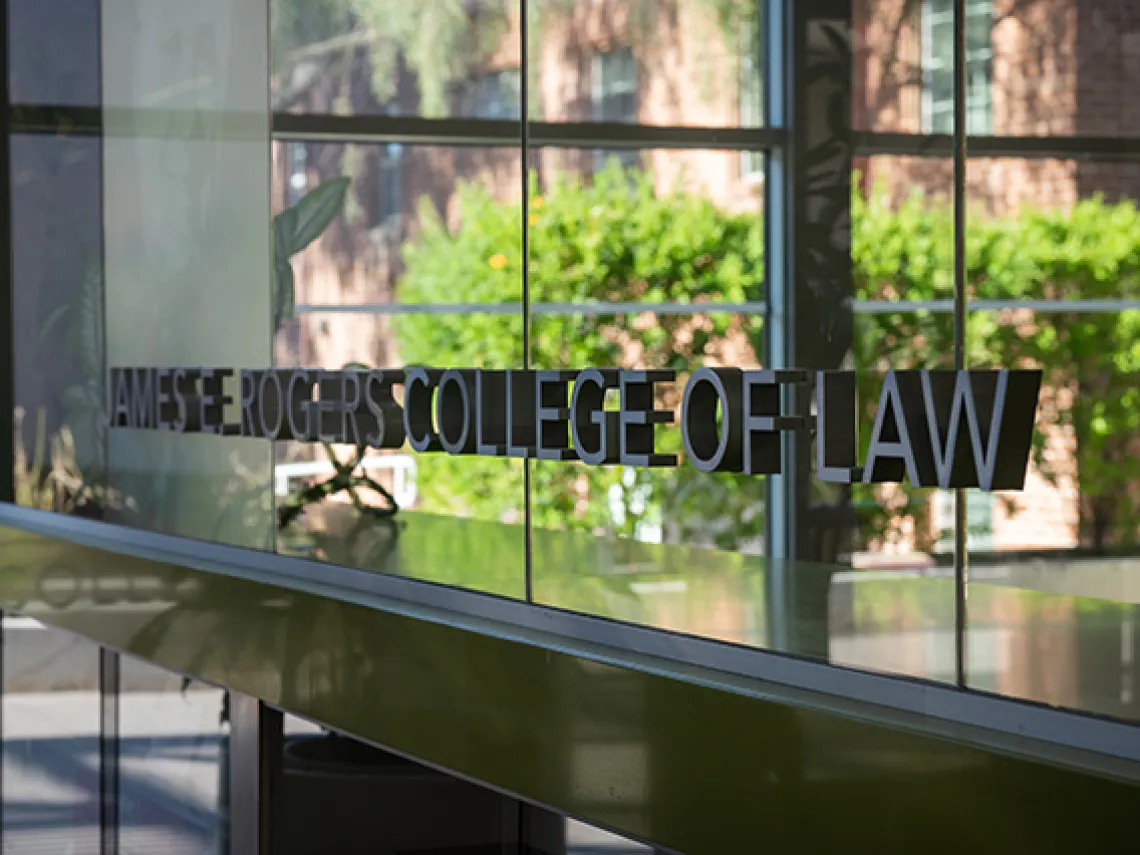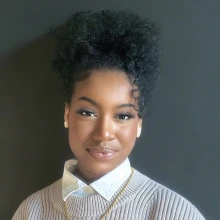Arizona Law Third-Year Student Davina Wizzard Wins 2025 Richard Grand Legal Writing Competition

Throughout his five-decade-long career, Tucson attorney Richard Grand (’58) worked tirelessly to achieve justice for his clients, and he achieved remarkable results, winning his clients over $1 million apiece in more than 100 cases. His success was partly predicated on his ability to lead jurors to the conclusion he wanted them to reach through persuasive storytelling and by painting “word pictures” that helped the jury see the facts from his client’s perspective. Grand was a self-described “merchant of words,” who shared his insights and experiences with others, both through founding legal societies for other personal injury attorneys and investing in law students’ lives. One of the ways that Grand invested in law students was by creating and sponsoring the Richard Grand Legal Writing Competition in 2000.
When asked about his success as a trial attorney, Grand explained that you must be able to “strike a spark” in the jury's mind with your words. This year students were asked to write about a memorable time in their life when someone’s words struck a spark in their mind or when their words struck a spark for someone else.

This year’s winning essay was selected from over 30 essays. Third-year law student Davina Wizzard placed first with her essay “The Tightrope of Faith,” in which she reflected on the resilience of faith and the power of supporting each other through life’s hardships.
The three additional finalists were:
Cooper Hilton (3L) – Second Place
Kyle James (3L) – Third Place
Niki Saenz (3L) - Honorable Mention
The following is the redacted version of the winning essay:
My father used to tell me that we walk a line of faith—a tightrope. He painted this picture where we teeter and totter, but we stay on because we know what is waiting for us on the other side. He always made the rope look so easy. In fact, in watching him, I began to believe that I just didn’t have the balance. Worse yet, that I’d never have his. While I was finding my footing, he was already taking his next steps, and I felt like all I could do was watch his back from a distance, my rope swinging and all. He always stepped with confidence. He didn’t just believe—he embodied that belief, making it into something tangible through the lessons he taught me. His stance always seemed unshakable, rooted in unspoken trust that he urged me to have. So I wonder when I first began to notice that his rope was shaking?
I could say it was the day he sat us down in the living room to tell the family he had cancer, but he spoke so calmly and assuredly when he told us that he would be okay. Or maybe it was the day he went in for surgery to have the tumor removed, but he was cracking jokes as soon as he was off the anesthesia. Perhaps it was the terrifying day he had a stroke with me sitting beside him while he was driving the car.
I was so preoccupied with my inner struggle during his many trials that when I finally looked up, proud in my stance, I realized I was sitting. Sitting in a new seat, in a new hospital, with him in another bed. It felt as though I had blinked, and suddenly, we were here, in this sterile, unfamiliar place, a fluorescent-lit room filled with machines and the soft hum of medical equipment. I felt his hand in mine as I took in our surroundings.
Then, in a tone I had never recognized my father to have, he spoke three words: “Baby, I’m scared.”
“What are you scared for?” I repeated, my voice catching in my throat.
“I’m scared that…” His voice came out shaky, unlike himself, as his eyes closed. “I’m scared that I’m going to be leaving soon.” He took a breath. “I’m scared that I’m not going to see my kids grow up.” He opened his eyes back up to the ceiling. “I’m scared of what’s next.”
So perhaps it was that anger, or a kind of desperation, that made me aggressively wipe the tear from my face, clear my choked-up throat, and say sternly, “If God’s got you like you say He does, then why are you worried?”
In the silence of the room, in the dimness of the light, I could see his rope stop shaking and steady beneath him. He turned his head slowly, his eyes finding mine for the first time. And in the newfound tightness of his grip, I could see his feet come together on the rope. My words lingered in the space between us, as the breaking man was breaking no more.
He nodded. “God’s got me,” he said, and though his voice was soft, I could hear the strength behind it.
I held his hand tighter. “God’s got you.”
From that moment on, I have never seen his rope shake like it did then. Trust me, there were many moments after that when it could have. The tightrope of faith is never meant to be easy. It was never meant to be free of struggle or doubt. My father taught me that we teeter and totter, but the beauty of it, the miracle of it, is that we keep going, step by step, holding onto the knowledge that something awaits us on the other side. So now when we can’t find our own balance, when the fear feels too great—at each doctor’s appointment, each new diagnosis, and each surgery —before he goes in and whenever he gets out, he would ask, “If God’s got me?”
“Then why are you worried?” I would answer, as we steadied our ropes together.
Judges for this year's competition were:
Honorable Barry G. Silverman – U.S. Court of Appeals for the 9th Circuit
Honorable Rosemary Marquez – United States District Court, District of Arizona
Daisy M. Jenkins, Esq. – Author and President of Daisy Jenkins & Associates, LLC
Tim Eigo, Editor of Arizona Attorney Magazine and Law College Association (LCA) Award Recipient
During the award ceremony, Eigo was awarded this year’s LCA Award for his exceptional commitment and service to the Arizona legal community.
About Richard Grand:
The Richard Grand Legal Writing Competition was created by the late Richard Grand, a 1958 alumnus of University of Arizona Law who drew inspiration from art throughout his life and legal career. He often compared closing arguments to jazz, and he likened the “spark” great actors light in the imaginations of a theater audience to the connection a skilled trial lawyer has with a jury.
An immigrant who arrived at Ellis Island in 1939 at the age of nine, Grand did not speak a word of English, but he soon grew into a self-proclaimed "merchant of words." Grand began his practice as a deputy county attorney. After that, his practice was limited to representing plaintiffs. On more than 100 occasions, he obtained either a verdict or settlement in excess of $1 million.
In 1972, Richard Grand founded the Inner Circle of Advocates, which is limited to 100 lawyers in the United States who have completed at least 50 personal injury trials and have at least three verdicts in excess of $1 million for compensatory damages. The Inner Circle still exists today.
